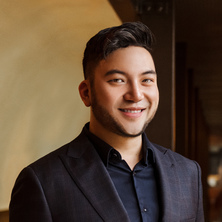
Overview
Background
Dr Brydon Wang is an author, lawyer, and scholar researching the trustworthy regulation of technology. His work focuses on how we design and govern benevolent data structures and decision-making systems that support human-centric, climate-resilient cities. Dually qualified in law and architecture, Brydon brings more than twenty years of experience across construction, legal practice, and academia. He is currently an Associate Director at KPMG, advising on major infrastructure transactions, and an Honorary Fellow at the Centre for Policy Futures at the University of Queensland.
Brydon’s research investigates how regulation can increase the perceived trustworthiness of decision-makers, particularly in contexts of automated systems and informational asymmetry. His interdisciplinary methods blend doctrinal legal analysis with creative research strategies. He was lead editor of Automating Cities: Design, Construction, Operation and Future Impact (Springer, 2021) and lead editor of the forthcoming Large Floating Solutions (Springer, 2025), a volume exploring sustainable marine infrastructure and governance, that follows on from the previous edited collection Large Floating Structures: Technological Advances (Springer 2015). His work has been featured by the Centre for Digital Built Britain (Cambridge University), The Conversation, ABC Radio National’s Future Tense, and Seeker’s How Close Are We to Living in the Ocean?
Before joining KPMG, Brydon taught contract law, data privacy, and AI regulation at the Queensland University of Technology, where he received the 2024 Vice Chancellor’s Award for Early Career Teaching. He also taught Responsible Data Science in UQ’s Master of Data Science programme. His PhD thesis, The Role of Trustworthiness in Automated Decision-making Systems and the Law, was awarded the 2022 Faculty of Business and Law Outstanding Doctoral Thesis Award. His research combines doctrinal legal research with creative research methodologies to explore the governance of automation, digital infrastructure, and smart urban systems. Through his creative research strategies, Brydon has also become an award-winning artist.
Brydon began his career in architecture and contract administration on award-winning construction projects, before practising as a technology and construction lawyer at Allens Linklaters. He remains passionate about integrating policy, law, and infrastructure to ensure technological systems are designed with trust and transparency at their core.
Availability
- Dr Brydon Wang is:
- Not available for supervision
- Media expert
Fields of research
Research interests
-
Trustworthy AI and Construction technology
-
Automation of Construction Contracts
-
Regulation and Legality of Floating Structures and Buoyant Urbanism
-
Floating Cities
Research impacts
Brydon's research helps us understand how we can regulate various technologies that are used to make cities smarter, human-centric and more responsive to climate change. His research falls within three themes:
- how we regulate to make infrastructure technology (InfraTech) more trustworthy, particularly the trust and protection of data to ensure its ethical use throughout the data lifecycle;
- how we regulate the automation of processes that enable us to design, develop and deploy technology and infrastructure; and
- design governance for climate-resilient cities, particularly flood-resistant buoyant urbanism (floating cities and amphibious architecture).
Works
Search Professor Brydon Wang’s works on UQ eSpace
2015
Book
Large Floating Structures: Technological Advances
C. M. Wang and B. T,. Wang eds. (2015). Large Floating Structures: Technological Advances. Ocean Engineering & Oceanography, Singapore: Springer. doi: 10.1007/978-981-287-137-4
2014
Journal Article
The case of Essendon v Australian Sports Anti-Doping Authority
Wang, Brydon (2014). The case of Essendon v Australian Sports Anti-Doping Authority. Sports Law Administration & Practice, 21 (5).
2014
Book Chapter
Great ideas float to the top
Wang, C. M. and Wang, B. T. (2014). Great ideas float to the top. Large floating structures. (pp. 1-36) Singapore, Singapore: Springer Singapore. doi: 10.1007/978-981-287-137-4_1
2008
Book Chapter
Colonization of the ocean and VLFS technology
Wang, Chien Ming and Wang, Brydon T. (2008). Colonization of the ocean and VLFS technology. Very large floating structures. (pp. 15-34) Abingdon, Oxon, United Kingdom: Taylor & Francis. doi: 10.1201/9781482265927-7
Media
Enquiries
Contact Dr Brydon Wang directly for media enquiries about:
- floating cities
- sensor society
- smart cities
- trust and construction
- trustworthy AI
Need help?
For help with finding experts, story ideas and media enquiries, contact our Media team:
